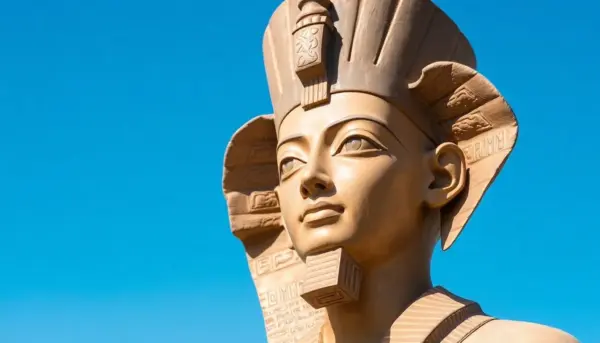The history of Ancient Egypt is not just an account of events; it's a rich tapestry woven with tales of power, divinity, and mystery. Among the most captivating figures of this civilization is the pharaoh, a ruler whose legacy has echoed through millennia. In this article, we will delve into the essence of what a pharaoh was, explore their significance, and spotlight some of the most important pharaohs who shaped Egypt's destiny.
Understanding the Role of the Pharaoh
The pharaoh was the supreme ruler of Egypt, a figure believed to govern by divine mandate. For centuries, pharaohs were regarded as semi-divine beings, embodying the god Horus, the son of Osiris and Isis. Their primary role was to act as intermediaries between the gods and the people, ensuring harmony and order in both the spiritual and earthly realms.
Over time, the perception of pharaohs evolved. They transitioned from being viewed as living gods to powerful human rulers. The term "pharaoh" itself means "great house," referring to the royal palace and symbolizing the residence of the divine spirit of Horus, one of Egypt's most revered deities. Horus was depicted as a human figure with the head of a falcon, crowned with the dual crowns of Upper and Lower Egypt.
Becoming a pharaoh was seen as a divine right, typically inherited through bloodlines. Upon death, the pharaoh's power would pass to their eldest son, or, in the absence of a direct heir, the priests would select a successor. This system established a theocratic government in which democracy was nonexistent, leaving the majority of the populace with minimal rights and influence.
Each pharaoh had a Great Royal Wife, whose primary duty was to bear heirs. While some, like Nefertiti, played crucial roles in governance, most pharaohs had the liberty to engage with numerous women. The societal structure was complex, reflecting the intertwining of power, family, and divinity.
Significant Pharaohs of Ancient Egypt
The annals of Egyptian history are filled with countless pharaohs, but a select few stand out due to their remarkable contributions and legacies. Here, we highlight some of the most significant rulers whose impacts resonate to this day:
1. Menes (Narmer)
Menes, also known as Narmer, is credited as the first pharaoh of Egypt, reigning around 3100 BC. He is celebrated for unifying Upper and Lower Egypt, establishing the first dynasty, and founding the capital city of Memphis. This strategic location enabled effective control over the fertile Nile Delta.
2. Hetepsejemuy
Reigning between 2820 and 2800 BC, Hetepsejemuy is recognized for further unifying the territories of Upper and Lower Egypt. His reign marked a vital step in the consolidation of Egyptian identity and governance.
3. Djoser
Djoser was the second pharaoh of the Third Dynasty, ruling from 2665 to 2645 BC. He is renowned for commissioning the Step Pyramid at Saqqara, a groundbreaking architectural feat that set the foundation for future pyramid construction.
4. Khufu (Cheops)
Khufu, often described as one of the most ambitious pharaohs, is best known for the Great Pyramid of Giza, one of the Seven Wonders of the Ancient World. Herodotus portrayed him as a harsh ruler, but his monumental achievements in architecture are undeniable.
5. Teti
Ruling from 2322 to 2313 BC, Teti was noted for being one of the most just pharaohs of Egypt. He initiated efforts to centralize governance, recognizing the growing power of local administrators and implementing tax exemptions in regions affected by poor harvests.
6. Amenhotep III
During his reign, Amenhotep III oversaw a period of unparalleled stability and prosperity in Egypt. His era was marked by extensive construction projects, including temples and monumental statues, which enriched the cultural landscape of the kingdom.
7. Akhenaten (Amenhotep IV)
Akhenaten was a revolutionary pharaoh known for introducing a form of monotheism centered around the worship of the sun disk, Aten. His radical ideas and the subsequent abandonment of traditional polytheistic practices led to significant upheaval in religious and political spheres.
8. Hatshepsut
Hatshepsut, the first female pharaoh, ruled from 1490 to 1468 BC. To maintain her authority, she often depicted herself in masculine attire. Her reign was marked by trade expeditions and monumental construction, although much of her legacy was erased after her death by her stepson, Thutmose III.
9. Tutankhamun
Tutankhamun, often referred to as the "boy king," ascended to the throne at a young age and ruled until his death at 19. While his reign was not particularly notable, the discovery of his nearly intact tomb in 1922 by archaeologist Howard Carter brought unprecedented insight into ancient Egyptian burial practices and treasure.
10. Seti I
Ruling between 1294 and 1279 BC, Seti I is remembered for restoring peace after years of turmoil. His hands-on approach in battles and governance exemplifies his dedication to safeguarding Egypt’s interests.
11. Ramses II
Often called Ramses the Great, Ramses II ruled for over 60 years, leaving an indelible mark on Egyptian history. He commissioned hundreds of monuments, including the magnificent temples at Abu Simbel, ensuring his legacy endured through the ages.
12. Ramses III
As the last great pharaoh of the New Kingdom, Ramses III defended Egypt against invasions by the Sea Peoples and worked to maintain stability during his reign. His era marked the beginning of the decline of the Egyptian Empire.
13. Cleopatra VII
Cleopatra VII, the last active ruler of the Ptolemaic Kingdom of Egypt, is perhaps the most famous pharaoh. Her intelligence and political acumen helped her navigate complex alliances with powerful Roman leaders like Julius Caesar and Mark Antony. Her reign ended with the Roman conquest of Egypt, marking the end of pharaonic rule.
These pharaohs not only governed but also shaped the cultural and spiritual landscape of Ancient Egypt. Their legacies continue to intrigue and inspire people today, reflecting the enduring power and mystery of this ancient civilization.
For those interested in exploring more about Ancient Egypt, here's a fascinating video that dives deeper into the lives of these remarkable pharaohs:
The history of the pharaohs is a testament to the complexity and richness of Ancient Egyptian civilization. It reminds us that behind every great monument and ancient relic lies a story of human ambition, divine belief, and cultural evolution.




